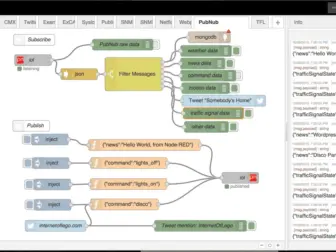Tag - Flow-based programming
Unlocking Scalable Software Design with Flow-Based Programming Principles
Unlocking Scalable Software Design with Flow-Based Programming Principles
Flow-based programming (FBP) is a paradigm that has been revolutionizing the way software is designed and built. Unlike traditional procedural or object-oriented programming, FBP focuses on defining applications as networks of “black box” processes, which exchange data across predefined connections by passing messages. These processes, known as components, can be reused and recombined, enabling developers to create complex systems from simpler, well-defined building blocks.
The fundamental concept of FBP is the separation of the control flow from the data flow. In traditional programming, data typically moves through a pre-defined sequence of operations. In contrast, FBP is akin to a factory assembly line, where data packets — often referred to as “information packets” (IPs) — travel through a network of independent processes that operate concurrently. Each component process operates on its input data packet, transforms it, and sends it down the line to the next process.
One of the most compelling advantages of FBP is scalability. As applications grow in complexity, maintaining and updating code can become increasingly challenging. FBP tackles this issue by promoting loose coupling between components. This means that individual components can be updated or replaced without affecting the rest of the system, as long as they adhere to the established data communication interfaces. This modularity also facilitates parallel development and testing, as teams can work on different components simultaneously without interference.
Another significant benefit of FBP is the enhancement of code reusability. Components are designed to perform discrete functions and are not tied to a specific application context. This allows developers to build a library of components that can be reused across multiple projects, reducing development time and increasing the overall quality of the software. Reusable components also help to enforce consistency across different applications, as the same processes are used to handle similar tasks.
Efficiency is another area where FBP shines. By its very nature, the paradigm supports concurrent execution of components. On multi-core processors, this can lead to substantial performance gains, as multiple processes can truly run in parallel. This is particularly useful for data-intensive applications, such as those found in data analysis, real-time processing, and simulation domains.
FBP also encourages a clear visualization of the system’s operation, which aids in understanding and debugging. Developers can see the flow of data through components and how they are interconnected, making it easier to identify bottlenecks or design flaws. This is beneficial not only for initial development but also for long-term maintenance and iterative improvement of the software.
While FBP offers many advantages, it also presents challenges. The paradigm requires a shift in thinking from conventional programming approaches, which can be a barrier for developers accustomed to those methods. Moreover, designing components that are genuinely reusable and establishing a well-defined communication protocol can be time-consuming and require meticulous planning.
Despite these challenges, the adoption of FBP is growing, driven by the need for more scalable, maintainable, and efficient software systems. Several programming languages and frameworks now support FBP, including Java with frameworks like Apache NiFi, and JavaScript with libraries such as NoFlo. As the software development industry continues to evolve, flow-based programming stands out as a promising approach to managing complexity in modern software applications.
